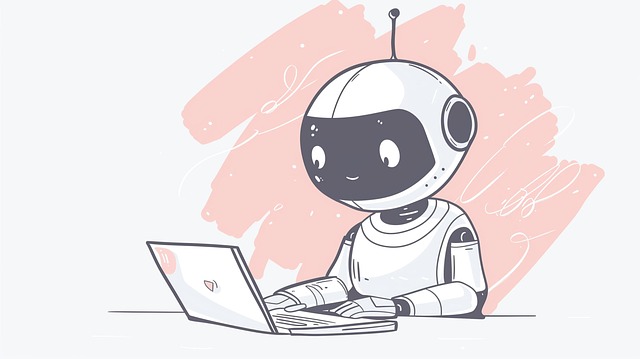AI chatbots, powered by advanced NLP and machine learning, revolutionize human-computer interaction with 24/7 availability, personalized experiences, and enhanced problem-solving. Free AI chatbots democratize technology, improve productivity, and offer businesses cost-effective customer service solutions. Top platforms like Dialogflow, Microsoft Bot Framework, and IBM Watson Assistant provide diverse options for integration into various sectors such as retail, education, healthcare, and more. While presenting opportunities, the rapid growth of AI chatbots also raises concerns about data accuracy, privacy, and security that must be addressed through ethical guidelines. Future advancements in NLP and machine learning promise even more human-like interactions across multiple platforms.
Discover the transformative power of AI chatbots with our comprehensive guide. From understanding their fundamentals to exploring the myriad benefits of free AI chatbots, this article covers it all. We delve into top platforms for accessing and creating your own ochatbot, revealing common use cases that illustrate their everyday relevance. Additionally, we address challenges and ethical considerations, while peering into future trends and innovations shaping this exciting technology.
- Understanding AI Chatbots: A Comprehensive Overview
- The Benefits of Using Free AI Chatbots
- Top Platforms to Access and Create Free AI Chatbots
- Common Use Cases for AI Chatbots in Everyday Life
- Overcoming Challenges and Ethical Considerations
- Future Prospects: Trends and Innovations in Free AI Chatbot Technology
Understanding AI Chatbots: A Comprehensive Overview

AI Chatbots are a revolutionary form of artificial intelligence that have taken the world by storm. These intelligent virtual assistants use advanced natural language processing (NLP) and machine learning algorithms to engage in human-like conversations, answer queries, and perform tasks across various platforms. An OC chatbot can assist with customer service, provide information, automate routine jobs, and even offer creative content generation, all without any human intervention.
Understanding the capabilities of AI chatbots involves grasping their ability to learn and adapt from user interactions. They analyze patterns in vast datasets, improve over time, and can be tailored for specific purposes. From simple question-answering systems to complex conversational agents, these chatbots enhance user experiences by offering 24/7 availability, personalization, and efficient problem-solving. With their versatility and potential to transform industries, AI chatbots are set to play a pivotal role in shaping the future of human-computer interaction.
The Benefits of Using Free AI Chatbots

Using free AI chatbots offers a multitude of advantages for individuals and businesses alike. One of the primary benefits is accessibility; these tools are often available to anyone with an internet connection, democratizing advanced technology and making it a viable option for personal or professional use. Free AI chatbots can enhance productivity by automating repetitive tasks, allowing users to focus on more complex work that requires human creativity and critical thinking.
Additionally, these chatbots provide a cost-effective solution for businesses looking to improve customer service without breaking the bank. They can handle basic customer inquiries, providing quick and accurate responses 24/7, which boosts customer satisfaction. Moreover, free AI chatbots can collect valuable user data, helping businesses understand their target audience better and tailor their services accordingly.
Top Platforms to Access and Create Free AI Chatbots

In today’s digital era, accessing and creating AI chatbots has never been easier. Several top platforms offer free services to developers and businesses looking to integrate conversational AI into their operations without breaking the bank. These platforms provide a range of tools and features, from simple rule-based chatbots to more advanced models that utilize natural language processing (NLP) for enhanced understanding.
Some notable options include Dialogflow, Microsoft Bot Framework, and IBM Watson Assistant. Dialogflow, owned by Google, offers a user-friendly interface and robust NLP capabilities. The Microsoft Bot Framework provides extensive integration with other Microsoft services and tools, making it ideal for organizations already invested in the Microsoft ecosystem. IBM Watson Assistant stands out for its advanced cognitive capabilities, enabling developers to create highly intelligent chatbots that can learn and adapt over time.
Common Use Cases for AI Chatbots in Everyday Life

AI Chatbots have seamlessly integrated into our everyday lives, offering a wide array of applications that enhance convenience and efficiency. From customer service interactions to personal assistants, these intelligent agents are revolutionizing how we engage with technology. One of the most common use cases is in retail, where AI chatbots power virtual assistants on e-commerce websites, providing product recommendations, answering queries, and guiding users through the purchasing process.
In addition, AI chatbots are increasingly being used for personalized learning experiences, offering tailored educational support to students. They can also act as language translators, breaking down communication barriers in real time. Moreover, their presence in healthcare is growing, with chatbots assisting patients in scheduling appointments, providing basic medical advice, and even offering emotional support through mental health services. These versatile tools have the potential to transform various sectors by streamlining tasks and improving user experiences.
Overcoming Challenges and Ethical Considerations

The development and widespread adoption of AI chatbots have come with their share of challenges and ethical dilemmas. One significant hurdle is ensuring that these AI models provide accurate and unbiased information. Since they are trained on vast datasets, any biases present in the data can be reflected in the chatbot’s responses. Developers must employ rigorous testing and validation methods to mitigate this issue and deliver reliable information to users.
Another crucial consideration pertains to user privacy and data security. As AI chatbots often interact with sensitive user data, it’s imperative to implement robust security measures to protect user information from unauthorized access or misuse. Furthermore, transparency regarding data collection practices is essential for maintaining user trust. Ethical guidelines and regulations play a vital role in guiding the development of AI chatbots, ensuring they are used responsibly and beneficially across various applications.
Future Prospects: Trends and Innovations in Free AI Chatbot Technology

The future of free AI chatbot technology looks promising, with continuous advancements pushing the boundaries of what’s possible. One prominent trend is the integration of natural language processing (NLP) and machine learning capabilities, allowing ochatbots to understand context, interpret nuances in human language, and generate more human-like responses. This evolution promises to enhance user experiences, making interactions with AI chatbots more engaging and intuitive.
Innovations are also focusing on expanding the versatility and functionality of these chatbots. Developers are exploring ways to integrate them into various platforms and services, from customer support and personal assistants to educational tools and content creators. As technology advances, we can expect AI chatbots to become increasingly sophisticated, offering personalized experiences tailored to individual users’ needs and preferences.
AI chatbots have revolutionized the way we interact with technology, offering unprecedented benefits across various sectors. As we’ve explored, free AI chatbots provide an accessible entry point into this transformative field, empowering individuals and businesses alike to leverage advanced natural language processing capabilities. With continuous advancements in technology, ethical considerations, and innovative trends shaping the future of AI chatbot development, there’s no denying these virtual assistants are here to stay. Embracing their potential can drive significant progress in enhancing user experiences, streamlining workflows, and fostering more intuitive human-machine interactions.
